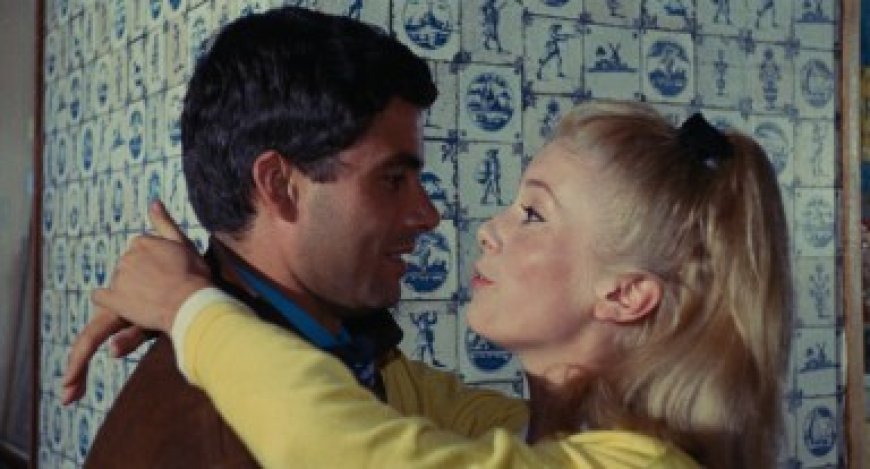On one hand, bi director Jacques Demy’s 1964 “The Umbrellas of Cherbourg” is a blazingly romantic ode to color and music. On the other, it’s a measured evocation of the disappointments that befall lovers when they age into adulthood. While it was a hit all over the world upon original release, its current reputation owes a great deal to a U.S. re-release in 1996, which played Film Forum at the time, so it’s a propos that it makes a return visit for its 60th anniversary. The bittersweet nature of “The Umbrellas of Cherbourg” is underscored by the reality of Demy’s life after its release: difficulty getting his later work financed, dying from AIDS complications in 1990. Suitably, it pays close attention to weather and the season’s passage, opening in rain and ending with an extended scene in snow.
Divided into three sections, “The Umbrellas of Cherbourg” relates two working-class youth falling in love in 1957. Genevieve (Catherine Deneuve) sells umbrellas in her mother’s shop, from which the film gets its name. Guy (Nino Castelnuovo) fixes cars in a gas station. While they plan to get married (although Genevieve is only 17) and have a child, Guy is drafted to fight for the French army against Algeria in its war for independence. The couple greet their passing with declarations that they can’t possibly live apart. Genevieve is so heartbroken that she thinks she’ll die. Their separation is expressed by Demy in a lovely shot in which Guy sings “mon amour” and Genevieve replies “je t’aime” as he leans out the door of a train moving steadily away from her. When the second part begins, she discovers that she’s carrying their child. Courted by Roland (Marc Michel), a character from Demy’s debut feature “Lola,” she sees her future in his wealth. Though she still longs for Guy, he rarely writes to her. When he comes back from Algeria, he’s angry and prematurely aged, suffering an injury that left him with a permanent limp.
“The Umbrellas of Cherbourg” isn’t just a musical. Every word of dialogue is sung, leaving little separation between scenes of day-to-day life and songs like “Watch What Happens.” (This makes it an operetta.) Demy’s 1967 “The Young Girls of Rochefort” paid homage to Hollywood musicals by casting “Singing’ in the Rain” star and co-director Gene Kelly. Even so, his work was postmodernist before the term was coined. As part of the French New Wave, he transformed and remixed his influences from American movies. Phil Backes wrote “the formula for what a musical should be has been subverted, twisted, and taken 10 steps further {by ‘The Umbrellas of Cherbourg’}…’Umbrellas’ had the veneer of the musical…but focused on a very grounded and human story.”
Despite the initial success of Demy’s career, he did not retain the audience that turned up for “The Umbrellas of Cherbourg.” His underrated “Model Shop,” a partial sequel to “Lola” made in Los Angeles, flopped. Although he kept working till 1988, he could only get four features produced in the ‘70s and three in the ‘80s. The radical musical “Un chamber en ville,” which applies some of the techniques of “The Umbrellas of Cherbourg” to a far angrier, more directly political story of a strike in 1955, was his last major film, but even now it’s rarely revived in theaters.
The palette of Demy and cinematographer Jean Rabier could not be more excessive. Endless variations on blue and pink appear in the same shot. (Until its restoration in 2004, the prints which circulated could do not justice to its colors.)
Its excess is calibrated so well that it remains tasteful. While composer Michel Legrand’s score plays for every second of “The Umbrellas of Cherbourg,” it settles down for passages of gentle strings, only to spring back to life with brassy horns. The contrast between highly stylized images and sound and a more realistic view of Guy and Genevieve’s love story persists.
Demy and fellow filmmaker Agnes Varda had been married two years when he made “The Umbrellas of Cherbourg.” However happy they may have been, the film’s narrative reflects the pain of being unable to publicly embrace a part of one’s sexuality. It offers several variations on the closet. At first, Guy and Genevieve conceal their dating from her mother. Although Roland genuinely likes Genevieve, their marriage is a convenient way to take care of her daughter and avoid the stigma of being a single mother. The theme of being unable to follow one’s heart to its seemingly logical conclusion is a universal one — after all, life has a way of interrupting the plans we make — but as expressed by a queer man, its resonance is more specific, even in a film about heterosexual romance. The melancholy arc of the story bears the mark of an outsider’s perspective on marriage.
“The Umbrellas of Cherbourg” | Directed by Jacques Demy | Janus Films | In French with English subtitles | At Film Forum 

 Mark
Mark 





